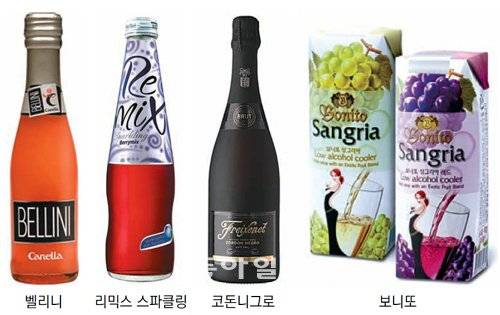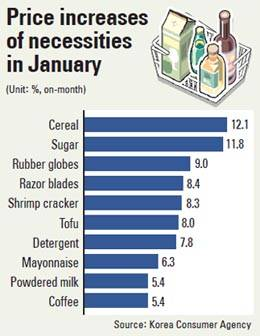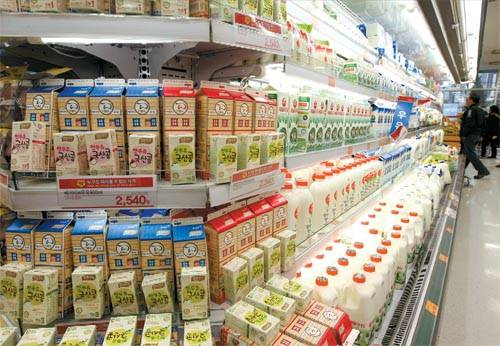FAS/Seoul Monitoring of Media Reporting on Agricultural Issues
Today's Date: Monday February 14, 2011
For Coverage: February 11-14, 2011
1. BILATERAL/MULTILATERAL ISSUES
To the National Assemblymen that came to U.S. to oppose KORUS FTA [Korean: BYK]
http://www.hankyung.com/news/app/newsview.php?aid=2011021321721
Summary: This is a summary of a commentary written by former U.S. congressman, Chang Joon Kim. I heard that some of the assemblymen from the opposition party had visited the Congress and conveyed their message that they oppose the KORUS FTA. Such visit was not carried in any of the local media in the United States. The congressmen that this team met were a few that had the same mind about labor affairs. I heard that the congressmen that had been opposing the KORUS FTA changed their mind after hearing how bad a deal the KORUS FTA was for Korea. If it is a bad deal for Korea that means that it is a good deal for the United States.
2. ECONOMIC ISSUES
Prices of 66% of Daily Items Rose in Jan. [English, MGF]
http://world.kbs.co.kr/english/news/news_Ec_detail.htm?No=79398
Prices of 66 percent of daily necessities rose last month despite government-wide efforts to curb inflation. The Korea Consumer Agency surveyed prices of 80 daily necessities in January and reported that 53 of them saw price hikes since December. Only 30 percent of the items have seen price drop, while two-and-a-half percent remained unchanged. The results show that curbing inflation in the nation appears to be challenging. The government had declared a war on consumer prices and announced to freeze public utility fees while clamping down on price fixing practices.
3. GRAIN & OILSEED ISSUES
Sale of Crop Disaster Insurance Starts Monday [English, MGF]
http://world.kbs.co.kr/english/news/news_Ec_detail.htm?No=79408
The Agriculture Ministry will sell from Monday through March 18th a disaster insurance plan for farmers at agro cooperative associations nationwide for five fruit items. The five fruits are apples, pears, oranges and two types of persimmon. The scheme will mainly insure the farmers against typhoon, wind and hail damage, but farmers can also arrange separate coverage for extreme cold or flooding.
4. LIVESTOCK ISSUES
Foot-and-mouth could stutter FTA schedule [Enlgish, MGF]
Summary: As Korea continues to be exposed for its ineptitude in containing the foot-and-mouth outbreak, conflict is emerging between ministries over whether the country should go slower in chasing free trade pacts with other economies. The Ministry of Food, Agriculture, Forestry and Fisheries insists that the government should take its foot off the gas pedal in free trade talks, at least until the disease is contained and the damage sustained by livestock farmers is assessed more thoroughly. The Ministry of Strategy and Finance, however, will have none of the argument.
Rival Camps to Discuss Assembly Resumption[English, MGF]
http://world.kbs.co.kr/english/news/news_Po_detail.htm?No=79403
Ruling and opposition parties will meet Monday for final coordination on the timetable and agenda for normalizing the extraordinary National Assembly session this month. FMD will be discussed.
N. Korea’s FMD outbreak spreads across country: report [Korean: BYK]
http://www.koreaherald.com/national/Detail.jsp?newsMLId=20110213000334
Summary: North Korea's foot-and-mouth disease (FMD) has spread across many parts of the country after the first case was confirmed in the capital city on Dec. 25, a U.S. broadcaster said Sunday. Radio Free Asia (RFA), quoting a report by the Paris-based World Organization for Animal Health, said the communist country confirmed that since the first case hit a small cattle farm in Pyongyang, the highly contagious animal disease has spread to at least five provinces. While there are no reports of animals being culled and buried, North Korea said 11,165 animals have been infected so far. Of these, 8,640 pigs have died along with 15 cattle, it said.
Dairy dilemma [English, CSY]
http://joongangdaily.joins.com/article/view.asp?aid=2932150
Milk is displayed at a discount store in Seoul yesterday. Many locals are concerned about the possibility of a milk shortage when students return to school in early March after their extended winter break, which will trigger an increase in demand. The outbreak of foot-and-mouth disease in Korea has affected the milk industry, leading to a decline in supply.
Seoul scraps milk production quota [English, CSY]
http://joongangdaily.joins.com/article/view.asp?aid=2932062
Summary: The government announced yesterday a range of measures to stabilize the supply of milk, as foot-and-mouth disease and a colder-than-normal winter are causing decreased milk production. Seoul said that in an effort to boost production, it would scrap a policy it established in 2002 that aimed at reducing milk surpluses. The Ministry of Food, Agriculture, Forestry and Fisheries said it would reduce tariffs on imported powdered milk, eliminate milk production quotas after production rights are transferred between farmers and consider the import of dairy cattle. In the short term, the ministry plans to eliminate tariffs on 9,000 tons of powdered milk through June. It also plans to discontinue a reduction in milk production quota for the next two years, after introducing the quota system in 2002. If the foot-and-mouth disease epidemic continues, the ministry said it would consider importing dairy cows from mad-cow-disease free nations including New Zealand and Australia.
S. Korea confirms 2 more bird flu outbreaks [English, CSY]
http://english.yonhapnews.co.kr/business/2011/02/13/95/0501000000AEN20110213001500320F.HTML
Full text: South Korea on Sunday confirmed two additional bird flu outbreaks in areas near Seoul despite nationwide efforts to stem the spread of the disease. The farm ministry said the new cases were reported at a medium-sized duck farm and a small poultry farm that raises chickens and ducks, which reported symptoms earlier in the week. All 8,400 birds on the two farms in Hwaseong south of Seoul and Dongducheon north of the capital have been culled and buried, with other bird farms within a 3-kilometer radius being checked for infections. The outbreaks are the first to be confirmed since a chicken farm that raised 35,000 birds tested positive for the virulent H5N1 strain on Wednesday, and the 42nd and 43rd outbreaks reported in the past 45 days. Since Dec. 31 when the first two avian influenza outbreaks were confirmed, Seoul reported cases in five provinces with 5.45 million birds being destroyed at 249 farms so far. Before the latest series of outbreaks, South Korea was hit by AI three times before, with the last cases occurring in April 2008 and resulting in a record 8.46 million birds being culled at a cost of around 264 billion won (US$235 million). Other outbreaks took place in the winter months of 2003-2004 and 2006-2007.
Milk shortage caused by FMD affecting local industries [English, CSY]
http://english.yonhapnews.co.kr/business/2011/02/13/30/0501000000AEN20110213001000320F.HTML
Summary: A nationwide milk shortage caused by the severest foot-and-mouth disease (FMD) outbreak in South Korea's history is affecting local confectionery and dairy industries, corporate sources said Sunday. Sources from Seoul Milk, Namyang Dairy Product Co. and the Korea Bakers Association said that as of December, the reserves of powdered skim milk stood at just 938 tons or a 77.3 percent drop from 4,137 tons reported a year earlier. The drop is directly related to the more than 34,000 heads of dairy cattle that were culled and buried since late November when the first FMD was reported in the country. The animals destroyed account for around 8 percent of total milk cows raised in the country. Seoul has ordered the culling of 3.29 million cattle, pigs, goats and deer so far to contain the FMD outbreak that has spread across most of the country at a cost of at least 2 trillion won (US$1.7 billion) so far.
N. Korea's FMD outbreak spreads across country: report [English, CSY]
http://english.yonhapnews.co.kr/national/2011/02/13/38/0302000000AEN20110213002600320F.HTML
Summary: North Korea's foot-and-mouth disease (FMD) has spread across many parts of the country after the first case was confirmed in the capital city on Dec. 25, a U.S. broadcaster said Sunday. Radio Free Asia (RFA), quoting a report by the Paris-based World Organization for Animal Health, said the communist country confirmed that since the first case hit a small cattle farm in Pyongyang, the highly contagious animal disease has spread to at least five provinces. While there are no reports of animals being culled and buried to control further spreading of the disease, North Korea said 11,165 animals have been infected so far. Of these, 8,640 pigs have died along with 15 cattle, it said. RFA also said that quarantine authorities had moved to vaccinate animals, but the locally produced drugs used had little effect in slowing down the disease. It added that emergency quarantine measures have been ordered to combat the spread of the animal disease that can be transmitted through the air.
5. MARKETING ISSUES
Drink with Straw … Small Volume, Low Alcohol Wines Get Popular [Korean, OSY]
http://news.donga.com/Economy/Market/3/0108/20110211/34760385/1
Summary: One of the most popular trends in the local wine market is increased attention on small volume, low alcohol wines that target young ladies. Many of the products are added with fruit juices for lower alcohol content and are packaged in non-traditional ways for different look from traditional wines.

Large Volume Packages Lead Sales Growth of On-line Grocery Retailers [Korean, OSY]
http://www.yonhapnews.co.kr/economy/2011/02/13/0318000000AKR20110213051600003.HTML?audio=Y
Summary: According to G-Market, a leading on-line grocery open market provider in Korea, sales of large volume packages showed higher growth than small volume packages. For example, sales of 20 kg bag rice rose 18 percent so far this year compared to the same period last year, while sales of 10 kg bag rose 13 percent. Sales of smaller packages such as 1 kg bag showed a decline. G-Mart commented that consumers of on-line grocery stores prefer large volume packages for delivery fee exemption as well as for lower unit cost.
6. NORTH KOREA ISSUES
Seoul Tightens Border Quarantine after FMD Outbreak in NK [English, MGF]
http://world.kbs.co.kr/english/news/news_IK_detail.htm?No=79401
South Korea has tightened quarantine inspections on automobiles and personnel crossing the inter-Korean border following North Korea’s confirmation of an outbreak of foot-and-mouth disease (FMD).
FT: Inflation, Food Shortage Threatening NK Regime [English, MGF]
http://world.kbs.co.kr/english/news/news_IK_detail.htm?No=79387
The Financial Times says that North Korea is suffering from serious inflation that is threatening the existence of the communist country. The newspaper quoted Japan-based news outlets on North Korea as saying that the price of rice surged from 12-hundred won per kilogram to 25-hundred won in just a month. The report said that the current food shortage is as serious as the food crisis in the 1990s during which two million North Koreans died from starvation and the North Korean regime was on the verge of collapse.
WFP, FAO Launch Food Inspection in NK [English, MGF]
http://world.kbs.co.kr/english/news/news_IK_detail.htm?No=79385
The Voice of America (VOA) is reporting that North Korea has allowed international organizations to look into its food situation even in regions where outside aid groups had been denied access. Kisan Gunjal, an official from the U.N.’s Food and Agriculture Organization, told the broadcaster that workers from the World Food Program (WFP) began an investigation into the food situation in North Korea on Thursday. He added that workers from other international organizations will join the WFP team on February 20th for a food inspection in regions where WFP workers had never been allowed. The WFP and FAO are planning to complete the food inspection by March 12th at the request of North Korean authorities.
7. OTHER MISCELLANEOUS ISSUES
Prices for necessities on the upswing [English, CSY]
http://joongangdaily.joins.com/article/view.asp?aid=2932152
Summary: The price of many everyday necessities soared in January despite government efforts to curb inflation, a state-run consumer protection agency said yesterday. Korea Consumer Agency said that among the 80 daily consumer necessities it watches - a list that includes sugar, cereal and detergents - prices for 53 of the items, or 66 percent, increased last month from December. Prices for 24 products fell, while two remained unchanged. The January numbers raise concerns about inflation, as the number of items that saw price rises soared from 31 in November and 37 in December. The increase in prices comes even after the government unveiled a set of measures to freeze utility rates and started extensive campaigns to investigate potential corporate cartel activities in a bid to keep inflation in check, the agency said.

S. Korea's producer prices surge 6.2 pct in Jan. [English, CSY]
http://english.yonhapnews.co.kr/business/2011/02/10/21/0503000000AEN20110210011700320F.HTML
Summary: South Korea's producer prices grew at the fastest clip in more than two years in January as hikes of agricultural and farm product costs added to raw material price growth, the central bank said Friday. The producer price index, a barometer of future consumer inflation, soared 6.2 percent on-year last month, accelerating from a 5.3 percent growth posted in December, the Bank of Korea (BOK) said in a monthly report. "Sharp surges in agricultural goods and pork prices also added to the upward growth amid unconventional weather conditions and outbreaks of foot-and-mouth disease," a BOK official said. Prices of fruit jumped 74.6 percent last month year-on-year while those of oil-related goods gained 13.2 percent, according to the BOK report. An unusually prolonged cold spell hampered fruit and vegetable output in the country while outbreaks of foot-and-mouth disease led to massive cullings of pigs and cows, pushing up meat prices.
The information in this report was compiled by the Agricultural Trade Office (ATO) at the U.S. Embassy in Seoul, South Korea. The press summaries contained herein do NOT reflect USDA, the U.S. Embassy, or other U.S. government agency official policy or view point. U.S. food exporters can learn more about market opportunities in South Korea by reviewing ATO Seoul’s Exporter Guide and other reports available at www.fas.usda.gov by clicking on “attaché reports”.



